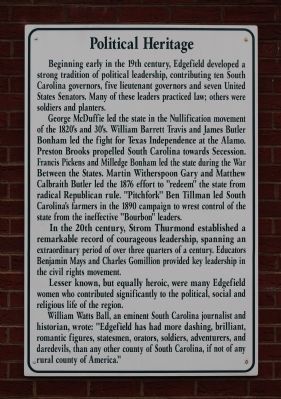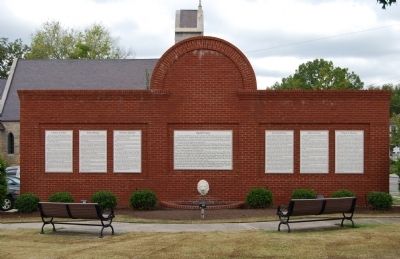Edgefield in Edgefield County, South Carolina — The American South (South Atlantic)
Political Heritage
George McDuffie led the state in the nullification movement of the 1820's and 30's. William Barrett Travis and James Butler Bonham led the fight for Texas Independence at the Alamo. Preston Brooks propelled South Carolina towards Secession. Francis Pickens and Milledge Bonham led the state during the War Between the States. Martin Witherspoon Gary and Matthew Calbraith Butler led the 1876 effort to "redeem" the state from radical Republicans. "Pitchfork" Ben Tillman led South Carolina farmers in the 1890 campaign to wrest control of the state from the ineffective "Bourbon" leaders.
In the 20th century, Strom Thurmond established a remarkable record of courageous leadership, spanning an extraordinary period of over three quarters of a century. Educators Benjamin Mays and Charles Gomillion provided key leadership in the civil rights movement.
Lesser known, but equally heroic, were many Edgefield women who contributed significantly to the political-social and religious life of the region.
William Watts Ball, an eminent South Carolina journalist and historian, wrote: "Edgefield has had more dashing, brilliant, romantic figures, statesmen, orators, soldiers, adventurers, and daredevils, than any other county of South Carolina, if not of any rural county of America."
Topics. This historical marker is listed in this topic list: Government & Politics. A significant historical year for this entry is 1876.
Location. 33° 47.4′ N, 81° 55.8′ W. Marker is in Edgefield, South Carolina, in Edgefield County. Marker is on Jeter Street, on the right when traveling west. Marker is located in the greenspace in the northwest corner of the intersection of Jeter and Bumcombe Streets. Touch for map. Marker is in this post office area: Edgefield SC 29824, United States of America. Touch for directions.
Other nearby markers. At least 10 other markers are within walking distance of this marker. Agricultural History (here, next to this marker); A History of Violence (here, next to this marker); The Name "Edgefield" (here, next to this marker); Industrial History (within shouting distance of this marker); Religion & Education (within shouting distance of this marker); Edgefield County (within shouting distance of this marker); First Term of Court (within shouting distance of this marker); Edgefield County World War I Memorial (within shouting distance of this marker);
Old Law Building (within shouting distance of this marker); Welcome to Historic Edgefield (within shouting distance of this marker). Touch for a list and map of all markers in Edgefield.
Also see . . .
1. George McDuffie. George McDuffie (August 10, 1790 – March 11, 1851) was a Governor of South Carolina and a member of the United States Senate. (Submitted on October 15, 2008, by Brian Scott of Anderson, South Carolina.)
2. Nullification Crisis. The Nullification Crisis was a sectional crisis during the presidency of Andrew Jackson created by the Ordinance of Nullification, an attempt by the state of South Carolina to nullify a federal law passed by the United States Congress. (Submitted on October 15, 2008, by Brian Scott of Anderson, South Carolina.)
3. William Barrett Travis. William Barret Travis (August 9, 1809 – March 6, 1836) was a 19th century American lawyer and soldier. (Submitted on October 15, 2008, by Brian Scott of Anderson, South Carolina.)
4. James Butler Bonham. James Butler Bonham (20 February 1807–6 March 1836) was a 19th century American soldier who died at the Battle of the Alamo during the Texas Revolution (Submitted on October 15, 2008, by Brian Scott of Anderson, South Carolina.)
5. Preston Brooks. Preston Smith Brooks (August 5, 1819 – January 27, 1857) was a Democratic Congressman from South Carolina, known for physically beating senator Charles Sumner on the floor of the United States Senate. (Submitted on October 15, 2008, by Brian Scott of Anderson, South Carolina.)
6. Francis W. Pickens. Francis Wilkinson Pickens (April 7, 1805 – January 25, 1869) was an American lawyer and politician who served as Governor of South Carolina when the state seceded from the United States during the American Civil War. (Submitted on October 15, 2008, by Brian Scott of Anderson, South Carolina.)
7. Matthew Butler. Matthew Calbraith Butler (March 8, 1836 – April 14, 1909) was an American military commander and politician from South Carolina. (Submitted on October 15, 2008, by Brian Scott of Anderson, South Carolina.)
8. Martin Witherspoon Gary. Martin Witherspoon Gary (March 25, 1831 – April 9, 1881) was a brigadier general in the Confederate States Army during the American Civil War and a Democratic politician in postbellum South Carolina. (Submitted on October 15, 2008, by Brian Scott of Anderson, South Carolina.)
9. Milledge Luke Bonham. Milledge Luke Bonham (December 25, 1813 – August 27, 1890) was a American politician and Congressman who served as the Governor of South Carolina from 1862 until 1864. (Submitted on October 15, 2008, by Brian Scott of Anderson, South Carolina.)
10. Benjamin Tillman. Benjamin Ryan Tillman (August 11, 1847–July 3, 1918) was an American politician who served as governor of South Carolina, from 1890 to 1894, and as a United States Senator, from 1895 until his death. (Submitted on October 15, 2008, by Brian Scott of Anderson, South Carolina.)
11. Bourbon Democrat. Bourbon Democrat was a term used in the United States from 1876 to 1904 to refer to a conservative or classical liberal member of the Democratic Party, especially one who supported President Grover Cleveland in 1884–1896 and Alton B. Parker in 1904. (Submitted on October 15, 2008, by Brian Scott of Anderson, South Carolina.)
Credits. This page was last revised on December 13, 2019. It was originally submitted on October 15, 2008, by Brian Scott of Anderson, South Carolina. This page has been viewed 908 times since then and 8 times this year. Photos: 1, 2. submitted on October 15, 2008, by Brian Scott of Anderson, South Carolina.

